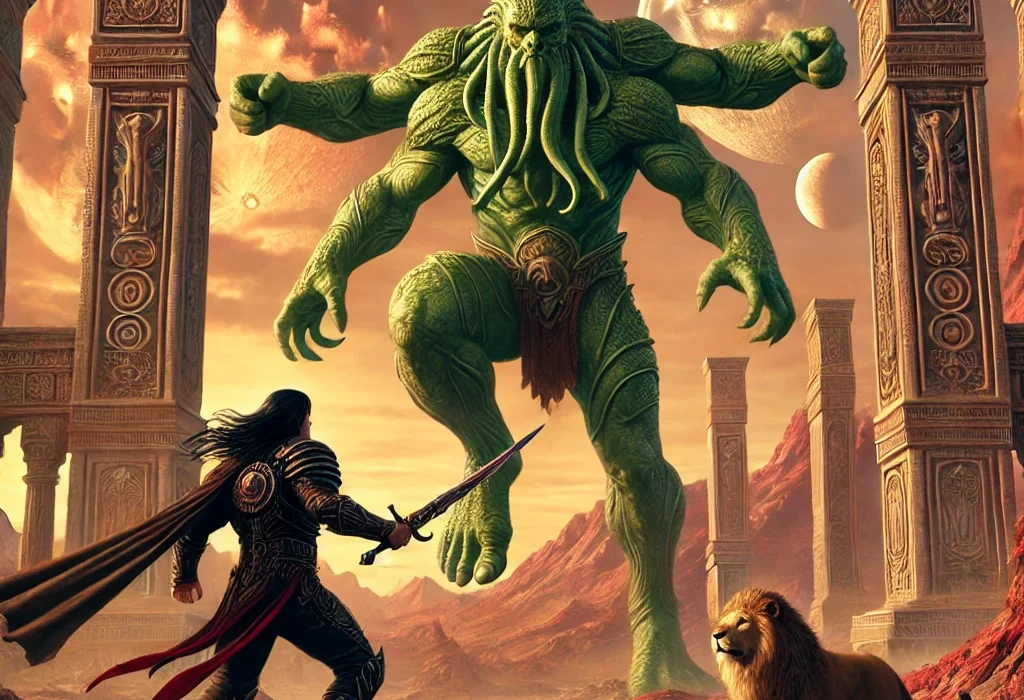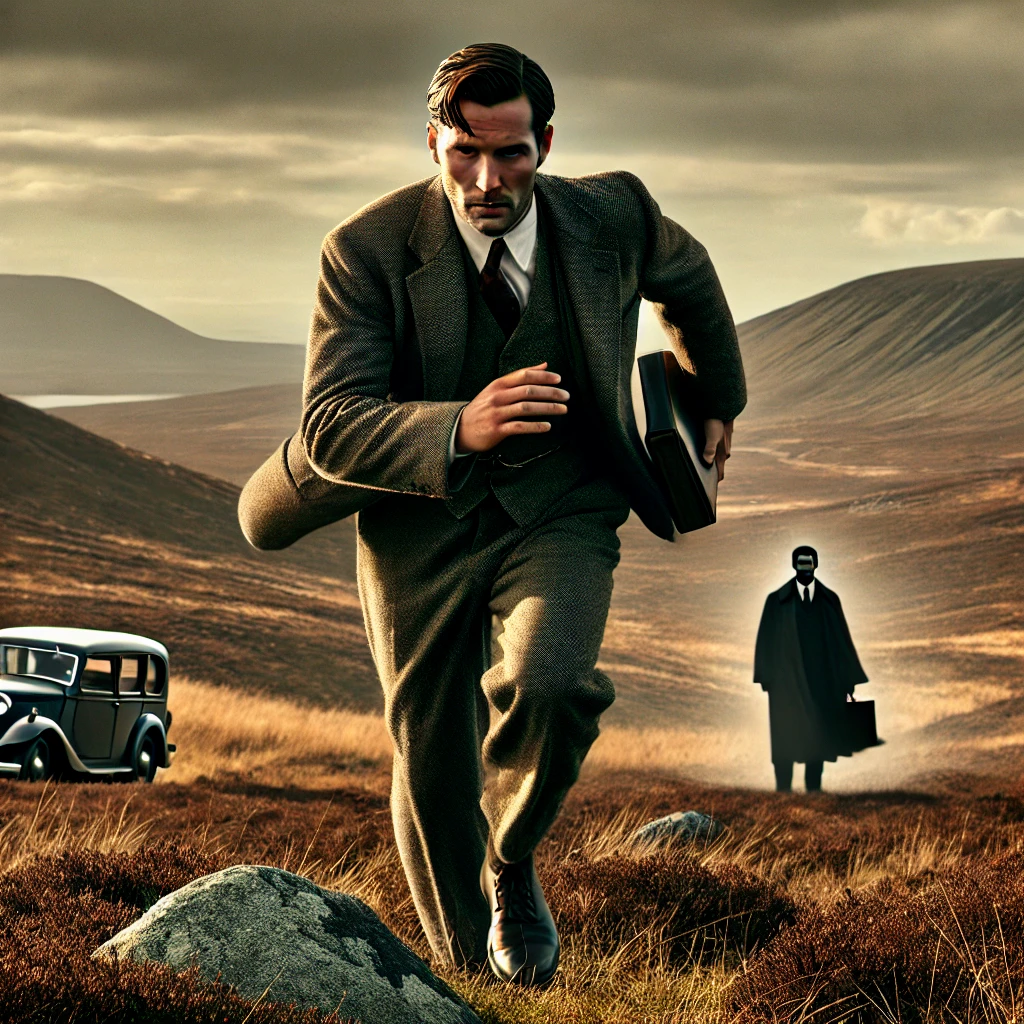“Thuvia, Maid of Mars” by Edgar Rice Burroughs, published in 1920, is the fourth book in the Barsoom series. It continues the adventures on Mars (Barsoom) with a new protagonist, Carthoris of Helium, the son of John Carter, and Dejah Thoris. This story introduces Thuvia, a princess of Ptarth, who becomes a central figure in the unfolding drama of political intrigue, love, and warfare on the red planet.
Plot Summary
In the scarlet gardens of Ptarth, beneath the blossoms of a giant pimalia, Thuvia, the princess of Ptarth, sits on a polished bench of ersite. Her brow is furrowed, for beside her stands Astok, the dark-haired prince of Dusar, whispering impassioned words. He confesses his love for her, pressing closer in his boldness. Thuvia recoils, anger flashing in her eyes. She reminds Astok that he forgets himself and the customs of Barsoom, that she has not granted him the right to speak so familiarly. Undeterred, Astok grasps her arm, pulling her toward him. Thuvia strikes him, her voice rising in a call for the guard.
Before the royal warriors can reach them, another figure emerges from the dense foliage. Carthoris of Helium, son of John Carter and Dejah Thoris, leaps toward them. With a single blow, he sends Astok sprawling into the pimalia bush. Carthoris greets Thuvia with respect and concern, his eyes filled with unspoken love. But Thuvia, maintaining her royal composure, instructs the guards to escort them both to the palace, averting a diplomatic incident that could plunge Ptarth and Dusar into war.
That night, Astok departs with his retinue, his departure unaccompanied by either Thuvia or Carthoris. The next day, Thuvia strolls through the palace gardens, her thoughts troubled. She is pledged to Kulan Tith, Jeddak of Kaol, though her heart remains uncertain. She recalls Carthoris’s words and actions, and the unspoken emotions between them. As she stands by a marble bench, a shadow falls over her. Carthoris, unable to bear the distance between them, has returned. He speaks of his love for her, but Thuvia gently rebuffs him, reminding him of her promise to another. Carthoris is wounded by her words but offers his loyalty and respect to her choice.
Shortly after, a dark plot unfolds. Thuvia is abducted from her father’s court, carried away on a mysterious flier. The emblem upon the ship is one of Helium, suggesting that Carthoris himself may be implicated. News of the abduction reaches Helium, and John Carter convenes a council. Carthoris denies any involvement, but suspicion remains. The only way to clear his name is to travel to Ptarth and offer his aid in finding Thuvia.
As Carthoris prepares for the journey, treachery lies in wait. A servant, a giant with a thin scar upon his face, tampers with the navigation device of Carthoris’s flier, setting it upon a course not of Carthoris’s choosing. Unaware, the prince sets off, his mind burdened with concern for Thuvia’s safety. He travels through the Martian night, only to awaken and find himself descending upon a deserted city, not Ptarth.
Far beneath him, Thuvia struggles against her captors. She is held in one of the forgotten cities of Mars, a place once grand, now desolate. As she is brought forth into the open plaza, she sees a flier descending from the sky. Hope stirs within her, but her captors are alert, ready to defend their prize. From the shadows, a monstrous figure emerges—a green man, towering and fierce. Thar Ban, jed among the hordes of Torquas, eyes the red woman with predatory intent. With a leap, he captures Thuvia and whisks her onto his thoat, fleeing into the dark avenues of the city.
Carthoris, seeing Thuvia in danger, draws his sword and springs from his flier. He engages the red warriors who had stolen Thuvia, his blade a blur of motion. One by one, they fall, but the last of them turns and flees, leaving Carthoris to pursue the green man alone. The prince rushes back to his damaged flier, trying to catch up to the swift thoat carrying Thuvia away.
Through the empty city and across the ochre sea-bottoms, Carthoris follows. His flier, injured from the earlier sabotage, begins to falter, drifting lower until it can go no further. Carthoris is forced to continue on foot, driven by his determination to save Thuvia. The trail leads him into the mountains, a region fraught with dangers. As he searches for any sign of the green man, he encounters a banth, a savage Martian lion, stalking through the rocks. Carthoris decides to follow the creature, hoping it may lead him to Thar Ban and Thuvia.
The banth leads him to a hidden cave, its entrance concealed behind a boulder. With sword in hand, Carthoris ventures into the darkness, descending into a long, winding tunnel. He moves cautiously, aware that danger could lurk in every shadow. The tunnel opens into a vast underground chamber, where the light of a thousand radium bulbs flickers upon the walls. Within this secret lair, Thar Ban has taken refuge, and with him, Thuvia of Ptarth.
Thuvia stands defiantly before her captor, her gaze unyielding. Thar Ban eyes her with a mix of admiration and savagery. He speaks of keeping her as a trophy, a prize among the green men. But Thuvia, with her regal bearing, is unafraid. She commands the banth that prowls nearby, her mysterious power over Martian beasts compelling it to obey her will. The banth snarls and crouches, ready to pounce upon Thar Ban.
At that moment, Carthoris bursts into the chamber, his sword drawn. Thar Ban turns to face him, and the two warriors engage in a fierce battle. Their swords clash in a flurry of strikes and parries, the air thick with the tension of life and death. Carthoris fights with the strength of his love for Thuvia, driving Thar Ban back with every blow. At last, the green man falls, mortally wounded.
Carthoris rushes to Thuvia’s side, but before he can speak, they hear the approach of others. The red warriors who had pursued Thar Ban have found their way into the lair. Carthoris and Thuvia, with the banth at their side, stand ready to face this new threat. But the warriors halt at the sight of Thuvia unharmed and Carthoris beside her. They recognize the prince of Helium and bow in deference, for the tale of his bravery has spread far and wide.
Together, they return to Ptarth, where Carthoris’s name is cleared, and the truth of Thuvia’s abduction is revealed. The prince of Helium’s heart is heavy with unspoken love, but Thuvia, though grateful for his heroism, remains bound by her promise to Kulan Tith. As Carthoris departs, Thuvia watches from the palace walls, her heart conflicted between duty and the stirring emotions she cannot yet understand.
Main Characters
- Carthoris of Helium: The son of John Carter and Dejah Thoris. A skilled warrior and nobleman, he is deeply in love with Thuvia of Ptarth. Carthoris embarks on a quest to rescue Thuvia after her abduction, showcasing his bravery and the honor of his lineage.
- Thuvia of Ptarth: The beautiful princess of Ptarth, Thuvia possesses a mysterious power to control the Barsoomian beasts. Although promised to another, she is the object of Carthoris’s affection and the catalyst for much of the story’s conflict.
- Astok of Dusar: The prince of Dusar who desires Thuvia for himself. His aggressive pursuit of her and disregard for Martian customs set off a chain of events that endanger both Thuvia and the peace between Martian kingdoms.
Theme
- Chivalry and Honor: The story continues Burroughs’ exploration of chivalric ideals, with Carthoris embodying the code of the noble warrior who fights for love and honor.
- Forbidden Love: Carthoris and Thuvia’s relationship represents the theme of love challenged by societal expectations and promises, creating a tension between personal desire and duty.
- Power and Intrigue: The abduction of Thuvia becomes a political affair, highlighting the complex power struggles and alliances between Martian nations, where personal desires can have significant political ramifications.
Writing Style and Tone
Edgar Rice Burroughs employs a vivid and imaginative narrative style in “Thuvia, Maid of Mars.” His prose is richly descriptive, bringing the Martian landscapes and creatures to life with a blend of science fiction and fantasy elements. The tone is adventurous and heroic, mirroring the epic nature of the Barsoom series. Burroughs’ narrative pacing is swift, filled with action, and peppered with dramatic confrontations that keep the reader engaged. The dialogue often carries a formal and courtly quality, reflecting the chivalric culture of the Martian societies he depicts.
We hope this summary has sparked your interest and would appreciate you following Celsius 233 on social media:
There’s a treasure trove of other fascinating book summaries waiting for you. Check out our collection of stories that inspire, thrill, and provoke thought, just like this one by checking out the Book Shelf or the Library
Remember, while our summaries capture the essence, they can never replace the full experience of reading the book. If this summary intrigued you, consider diving into the complete story – buy the book and immerse yourself in the author’s original work.
If you want to request a book summary, click here.
When Saurabh is not working/watching football/reading books/traveling, you can reach him via Twitter/X, LinkedIn, or Threads
Restart reading!








